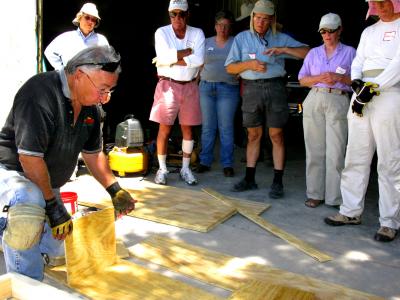NMSU to offer 'chicken tractor' workshop at Las Cruces campus

It's a chicken tractor, also known as a mobile chicken coop, and it is becoming a hot item with backyard chicken farmers.
New Mexico State University will be offering a workshop on building these devices, with tips on raising chickens, on Saturday, Oct. 13, from 8 a.m.-4 p.m. Hosted by the NMSU Horticulture Forum Club and the Department of Plant and Environmental Sciences, the workshop will be at the Animal Science Farm, near the intersection of Knox Street and College Drive on the Las Cruces campus.
Del Jimenez, NMSU Cooperative Extension Service agricultural specialist with the Rural Agricultural Improvement and Public Affairs Project, will lead the workshop, which includes actually constructing a chicken tractor. He has designed several models and has been encouraging their use by small farmers in the northern part of the state.
"We have been working with chicken tractors for about 15 years in Northern New Mexico," said Jimenez, who is based at NMSU's Sustainable Agriculture Science Center at Alcalde. "But they should work just as well in the southern part of the state."
A chicken tractor is essentially a portable structure that provides a humane and secure environment for chickens to roost and lay their eggs. With framed walls and roof and a wire-grid floor, they are built to keep chickens in while keeping out coyotes, skunks, raccoons and other predators. The poultry can easily be let out to roam the yard in the daytime.
The structures are equipped with wheels on the four corners and are light enough to be moved by hand or with a small tractor or lawnmower.
From a sustainability perspective, systematically moving the coops from location to location in the yard benefits both the chickens and the grass.
According to Jimenez, the areas most recently under the relocated coop, where chicken manure has accumulated, attract bugs for the foraging chickens to feed on when they are outside the coop. And as they scratch around for seeds and other nutrients, the chickens work the manure into the soil, enhancing the soil's fertility.
The birds' range can be controlled with the use of a mobile electric fence attached to the coop.
Moving the coop periodically keeps the chickens' egg-laying environment more hygienic, too, according to Jimenez, who suggests moving it every week.
The models Jimenez has designed include nesting boxes, roosts and a sheltered area for cooler nights. In the winter, a simple light bulb can provide adequate heat for the chickens to huddle around. A central beam holds up a sturdy roof and provides a place to hang an automatic watering device and a feeder.
According to Hort Forum secretary and event organizer Juliette Enfield, the workshop will feature a chicken tractor model that accommodates 30-40 chickens. The basic principles apply to other sizes, too.
Jimenez said the materials for the coop to be constructed in this workshop run about $600-$700.
The cost for attending the workshop is $20 for the general public and $15 for students. The fee will cover the materials needed to build the coops. Participants are responsible for bringing their own lunch. To register, go to the PES main office in Skeen Hall N127 or call at 575-646-3405. For answers to questions, email nmsu.hort.forum@gmail.com.
To view a video about chicken tractors featuring Jimenez, go to http://www.youtube.com/watch?v=oKAQypq109M.


